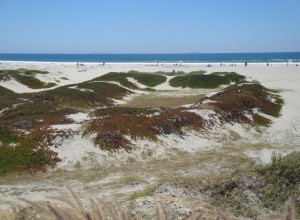 The ocean does so much for us. It gave us life and continues to give us life. To celebrate the ocean, here are a few ocean facts:
The ocean does so much for us. It gave us life and continues to give us life. To celebrate the ocean, here are a few ocean facts:
The ocean covers nearly 71 percent of the Earth’s surface.
About 95 percent of the ocean remains unexplored.
Roughly half of the oxygen we breathe is produced by the ocean.
The Great Barrier Reef is the largest living structure on Earth. It can be seen from the Moon.
 Fish supply the greatest percentage of the world’s protein consumed by humans.
Fish supply the greatest percentage of the world’s protein consumed by humans.
Populations of large fish such as tuna, cod, swordfish, and marlin have declined by as much as 90 percent in the past century.
Plastic waste kills up to one million sea birds and 100,000 marine mammals each year.
The ocean could contain more plastics than fish by 2050.
It’s estimated that more than 90 percent of marine species are directly or indirectly dependent on coral reefs.
Nearly 60 percent of the world’s remaining reefs are at significant risk of being lost in the next three decades. The major causes of coral reef decline are coastal development, sedimentation, destructive fishing practices, pollution, tourism, and climate change.
 Global bycatch — unintended destruction caused by the use of non-selective fishing gear such as trawl nets, longlines and gillnets — amounts to 20 million tons a year. The annual global bycatch mortality of small whales, dolphins, and porpoises alone is estimated to be more than 300,000 individuals.
Global bycatch — unintended destruction caused by the use of non-selective fishing gear such as trawl nets, longlines and gillnets — amounts to 20 million tons a year. The annual global bycatch mortality of small whales, dolphins, and porpoises alone is estimated to be more than 300,000 individuals.
The world’s oceans absorb about 25 percent of the carbon dioxide released into the atmosphere each year. That uptake is growing as carbon dioxide levels rise. Because of this, the ocean is growing acidic at a pace that’s 100 times faster than at any time in the last 20 million years.
(Compiled from NOAA, The Thomson Reuters Foundation, savethesea.org, Oceana, and The Christian Science Monitor.)
The ocean does so much for us. Here are a few things you can do for the ocean:
Ten Things You Can Do to Save Our Ocean (from UN Development) – We see these lists all the time and they’re usually the same – this one isn’t.
Protect Dolphins and Marine Life from Seismic Blasting
Tell Congress to Stop New Offshore Drilling Agenda
Thank you to Coleen Patrick and Letizia at Reading Interrupted for the latest reviews of Ocean Echoes. It means so much to me that you’d take the time to do that. Reading Interrupted celebrates books and reading in amazing, unique ways and Coleen is a talented writer and illustrator. If you’re not already familiar with their blogs, please take a look and make sure to follow.
Happy World Oceans Day!





